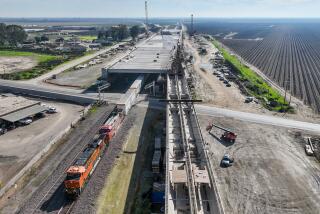Feud Over RTD Request to Audit Red Line Seen Threat to U.S. Funding
- Share via
Federal transportation aid to Los Angeles could be endangered by a disagreement between the Southern California Rapid Transit District and the Los Angeles County Transportation Commission over an audit of Metro Red Line construction funds, RTD board President Marvin L. Holen said.
In letters mailed Monday to Supervisor Mike Antonovich, Mayor Tom Bradley and City Council President John Ferraro, Holen said that if federal funds for the subway are not audited soon, “the continued flow of federal funding . . . (will be) put at risk.”
LACTC Executive Director Neil Peterson said the RTD audit would be redundant and a waste of money. On Monday, he circulated a memo to LACTC and RTD board members that proposed to end the dispute by amending federal law to eliminate the RTD from the project.
“Here we have a chance to save some taxpayer money and at the same time solve a part of the RTD’s ($60-million) budget problem,” Peterson said. “Why not take it?”
The two agencies--bitter rivals in the midst of a state-mandated merger--share responsibility for the first, 4.4-mile leg of the subway, scheduled to start service between Union Station and MacArthur Park in June, 1993. The LACTC designed and is building the system, while the RTD is the official recipient of federal aid.
Because of this, Holen, in his sharply worded letter to the elected officials, insisted that an RTD audit is essential.
“Whenever management in any organization appears to be avoiding a legitimate audit of its affairs, it needlessly arouses suspicion and brings into question the financial integrity of the organization,” he concluded. “This is something the LACTC management can ill afford at a time when the credibility of the LACTC has already been seriously challenged.”
Peterson, already under fire for excessive spending on consultants and expenses, said the LACTC routinely calls in auditing consultants to supplement its internal audit team. But the RTD said that practice does not meet federal standards because it amounts to the LACTC auditing itself.
Peterson said that if a truly independent audit is required, the federal government should be called upon to serve as an unbiased third party between the feuding LACTC and RTD.
Bradley, for one, weighed the issue cautiously.
“There are two transit agencies involved in the matter and two sides to the story,” the mayor said through his press secretary, Bill Chandler. “The mayor has asked his staff to look into it. Besides that, it’s too early to say anything.”
Ferraro, noting that the Los Angeles City Council is increasingly concerned about how the LACTC is spending the city’s $134-million share of the construction tab, said he will write to the LACTC, asking it to allow the RTD audit. “I think they should reply to the request of the RTD,” he said.
Antonovich, who is also chairman of the LACTC board, did not publicly respond to Holen’s letter Tuesday, nor did federal officials. Stewart Taylor, regional administrator for the Federal Transportation Administration, left his office Tuesday morning and did not return.
The RTD began the job of building the 4.4-mile first leg of the subway, and relied on federal grants for about half of the project’s $1.45-billion budget. Following allegations of huge overruns and delays, construction management in 1990 was turned over to the LACTC. However, the federal grants remained the RTD’s responsibility.
The Federal Transportation Administration said in a 1991 letter to the RTD that the transit district remained responsible for ensuring the “proper expenditure of project funds . . . (in) compliance with all terms and conditions of its grant agreement.”
RTD Inspector General Ernesto V. Fuentes said federal auditors would pore over project records once the Red Line starts running. He said he wants to do his own audit first because the federal officials would likely disallow spending federal money for any improper or inadequately documented expenses and could ask RTD to reimburse the money.
“When an auditee refuses access to a grantee to make sure how its money is being spent, that makes it a crisis,” Fuentes said.
More to Read
Sign up for Essential California
The most important California stories and recommendations in your inbox every morning.
You may occasionally receive promotional content from the Los Angeles Times.










